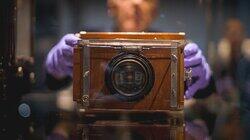Episode 5

The spotlight falls on objects representing industry and design.
Curator Martin is preparing for a new exhibition showcasing a leading postwar photographer, Maurice Broomfield. Broomfield captured British factories, steelworks, laboratories and plants in their heyday, when manufacturing was booming in the 1950s and 60s. Before his death in 2010, Maurice donated his entire life's work of 30,000 prints to the V&A. Martin is choosing the best to put on display. But some of the prints are now 60 years old and need painstaking conservation before they can go on show.
Martin travels to meet Maurice's son, documentary filmmaker Nick Broomfield, to learn more about his father's fascination with machines and mechanical marvels – including an array of cameras that were the tools of Maurice's trade.
Another new donation gives an insight into a postwar success story – the much-loved fashion brand Biba. Collector Danuta Laughton is donating a range of outfits made by Biba in the 60s and 70s, but curator Jenny is amazed to learn that Danuta also wants to donate a rare survival that reveals how Biba operated. It's a production file, containing orders and instructions to a factory for making 120 different garments. The file shows how very short production runs of garments was one of the keys to Biba's success. Jenny describes the production file as ‘one of the most exciting things I have ever seen' – especially when she learns that the file was saved for posterity from a skip.
Biba's founder, Barbara Hulanicki, flies in from Miami to see the production file and to meet Danuta and Jenny. Barbara was born in Poland but grew up in Britain and founded Biba in 1963. Biba was to revolutionise high street retail, offering not just clothing but a whole way of life to its loyal customers.
The V&A doesn't just celebrate works of Western design and manufacture. Curator Avalon wants to display a work acquired by the museum in 1852 but never exhibited. It's a jamdani stole, a fabric of exquisite and painstaking design made in what is now Dhaka, Bangladesh. Dhaka was home to a whole industry of textile weavers famous for their intricate decorative work. Their fabrics were so fine they were almost transparent, earning them names meaning ‘running water', or ‘woven air'.
But before this unseen textile can go on show, conservator Elizabeth-Anne must remove decades of dust and grime. Despite three hours of handwashing in a custom-made bath using museum-grade detergents, the stole is still looking less than perfect. So Elizabeth-Anne deploys her secret weapon – an ultrasonic wand that releases tiny bubbles to dislodge the stubborn stains.
In Stoke-on-Trent, curators Catrin and Rebecca at the V&A Wedgwood Collection are celebrating the experiments and trial runs of pioneering potter and industrialist Josiah Wedgwood. Wedgwood transformed English pottery from a cottage craft to a world-beating industry in the late 18th century, and his trial runs show how he did it. Catrin and Rebecca are handing over 500 individual trial pieces to ceramic artist Neil Brownsword, who wants to display them in an exhibition nearby. These small fragments reveal Wedgwood's rigorous approach to making the perfect pottery as he experimented with different glazes and firing temperatures to produce the affordable and robust creamware for which he became famous.
Trailer
Recently Updated Shows

The Creep Tapes
Based on a collection of videotapes in the secret vault of the world's deadliest and most socially uncomfortable serial killer, who hires his victims to film him for the day under false pretenses, each episode exposes a new victim from one of the fabled 'Creep Tapes'.

America's Funniest Home Videos
ABC's longest-running primetime entertainment show, America's Funniest Home Videos, returns for season 36 this fall with the same mission -- giving families something genuinely funny to enjoy together on Sunday nights.
"AFV," the longest-running primetime entertainment show in ABC history, returns for season 36 with the same mission - to provide viewers with hysterical moments that fly by at a dizzying pace.

The Real Housewives of Potomac
Just up the river from our nation's capital lies a hidden gem—Potomac, Maryland. Its rolling hills, gated mansions, sophisticated prep schools, and exclusive country clubs all serve to keep the area invitation-only. Sprinkled throughout this community are a handful of old-line, wealthy African-American families who have historically broken racial barriers to provide a life of privilege for their children. The Real Housewives of Potomac follows the upscale lives of six intriguing, well-to-do women: Gizelle Bryant, Katie Rost, Karen Huger, Charrisse Jackson-Jordan, Robyn Dixon, and Ashley Darby, all of whom have fought for their places in this society by way of legacy or marriage. In a town where entry is granted only through class, pedigree, and lineage, how far will these ladies go to secure their spot at the top of this prestigious circle?

The Traitors Canada
Follow a group of contestants – including some familiar faces – who live together as they complete a series of challenges with the goal of earning a cash prize. The catch? Some of the contestants are traitors who will attempt to deceive and manipulate their way to the prize instead of sharing it amongst the group. In this psychological adventure will the traitors be unmasked in time?
